BABAL
THE DYSTOPIAN TALES OF THE PSYCHEDELIC THEATER
di Domenico Caccamo e Giampiero Fleba
Hey, I wanna experience the big everything
the big top and the great abyss, not miss one thing
Hey, I wanna experience the big everything
how it feels to be tall, flowing through the bodies,
warm and singing
Musica, testi, arte visuale. Tre parti di un corpo vivente per accedere allo sguardo del rock psichedelico underground. Un’esperienza di ascolto dove immergersi liberamente come se andassimo a vedere un film. Protagonista: BABAL, vibrazione britannica potente, insieme di suoni, parole, simbolismo e teatro. Incredibili dal vivo ed altrettanto espressivi su disco con copertine impressionanti, una densità sonica elevata tra frequenze spaziali ed attitudine post-progressive per sfidare il concetto di genere musicale con una fusione creativa che fluisce come una percezione unica. E’ soprattutto la visione artistica di Karen Langley (voce e testi) e Rob Williams (chitarra e 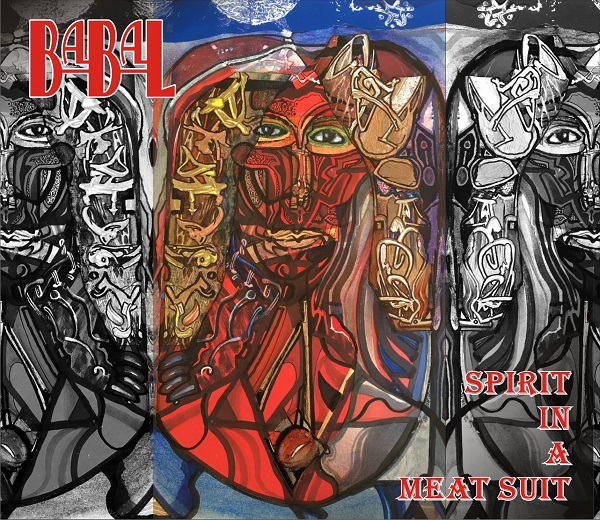 musica), coppia nella vita e ideatori di un progetto attivo dai primi anni 2010. Un viaggio che però inizia negli anni 90 con vari collaboratori ed esperienze da Wise Children a Babble, la prima incarnazione di BABAL, artefici di “Shape of the Flux” (2012) e “Bread and Circuses” (2012). Gli album “Singular Adventures in Post-Modern Capitalist Society” (2016) e “The Circle of Confusion of Tongues” (2018 – parte iniziale dell’omonima trilogia) sono le prime potenti escursioni BABAL in territori vibranti di chitarre e tastiere, ritmi propulsivi, eterei scenari cosmici. Dinamismo in motion che aggiunge suggestioni alla prospettiva con vari video di grande espressività come ‘Speed’, ‘Endless Re Run Society’, ‘The Circle of Confusion of Tongues’ e ‘Dead Centre’. La musica amplifica il significato dei testi e viceversa come una voce che esclama per farsi ascoltare in un mondo impazzito con l’album “Spirit in a Meat Suit” (2021) ed il digital track ‘Zombie Diary’, recentissime realizzazioni di una nutrita discografia (tra cui l’EP “Hanging in the Balance” del 2015, una delle prime recensioni di Plenirockium). Una storia intensa e anche di grande forza interiore che Karen e Rob ci raccontano con passione…
musica), coppia nella vita e ideatori di un progetto attivo dai primi anni 2010. Un viaggio che però inizia negli anni 90 con vari collaboratori ed esperienze da Wise Children a Babble, la prima incarnazione di BABAL, artefici di “Shape of the Flux” (2012) e “Bread and Circuses” (2012). Gli album “Singular Adventures in Post-Modern Capitalist Society” (2016) e “The Circle of Confusion of Tongues” (2018 – parte iniziale dell’omonima trilogia) sono le prime potenti escursioni BABAL in territori vibranti di chitarre e tastiere, ritmi propulsivi, eterei scenari cosmici. Dinamismo in motion che aggiunge suggestioni alla prospettiva con vari video di grande espressività come ‘Speed’, ‘Endless Re Run Society’, ‘The Circle of Confusion of Tongues’ e ‘Dead Centre’. La musica amplifica il significato dei testi e viceversa come una voce che esclama per farsi ascoltare in un mondo impazzito con l’album “Spirit in a Meat Suit” (2021) ed il digital track ‘Zombie Diary’, recentissime realizzazioni di una nutrita discografia (tra cui l’EP “Hanging in the Balance” del 2015, una delle prime recensioni di Plenirockium). Una storia intensa e anche di grande forza interiore che Karen e Rob ci raccontano con passione…
Cosa potete dirci della vostra esperienza musicale. Come è iniziato tutto e cosa avevate in mente. Avete mai pensato che sareste arrivati così lontano?
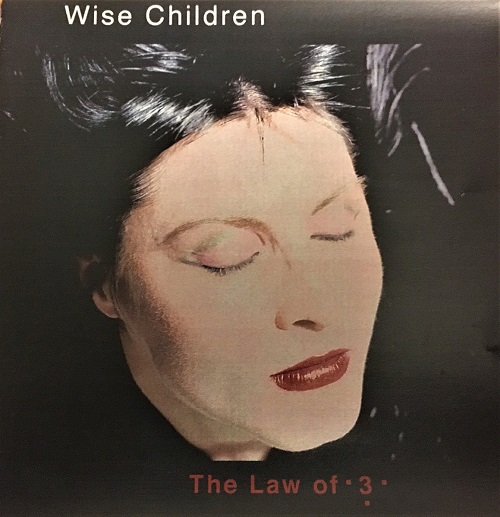 Rob (B) Ci siamo conosciuti nel 1992 quando un nostro amico stava organizzando un’esperienza di danza/musica sperimentale “The Cauldron of Colours”, da lì abbiamo pensato di poter lavorare insieme e abbiamo iniziato a improvvisare idee su un registratore a cassette Teac 4 tracce. Avevo già lavorato con il nostro batterista di sempre Jon Sharp in un altro progetto e anche con un amico bassista di lunga data Paul Smith. Abbiamo iniziato a improvvisare con loro registrando un sacco di pezzi improvvisati in uno studio professionale: “The Mr. Grin tapes”, che non sono mai stati pubblicati.
Rob (B) Ci siamo conosciuti nel 1992 quando un nostro amico stava organizzando un’esperienza di danza/musica sperimentale “The Cauldron of Colours”, da lì abbiamo pensato di poter lavorare insieme e abbiamo iniziato a improvvisare idee su un registratore a cassette Teac 4 tracce. Avevo già lavorato con il nostro batterista di sempre Jon Sharp in un altro progetto e anche con un amico bassista di lunga data Paul Smith. Abbiamo iniziato a improvvisare con loro registrando un sacco di pezzi improvvisati in uno studio professionale: “The Mr. Grin tapes”, che non sono mai stati pubblicati.
Stavo attraversando la rottura del mio matrimonio e sempre più gravitavo verso Karen: siamo diventati anime gemelle a molti livelli. Ciò che avevamo in mente si è evoluto attraverso la creazione mantenendoci molto indipendenti come musicisti e seguendo il nostro percorso, che penso sia il motivo per cui siamo sempre stati difficili da classificare. Abbiamo iniziato come Wise Children, abbiamo cambiato il nome in Babble e in seguito ci siamo resi conto che c’era già una band con quel nome che era abbastanza conosciuta, quindi siamo diventati BABAL (che comunque si pronuncia come babble –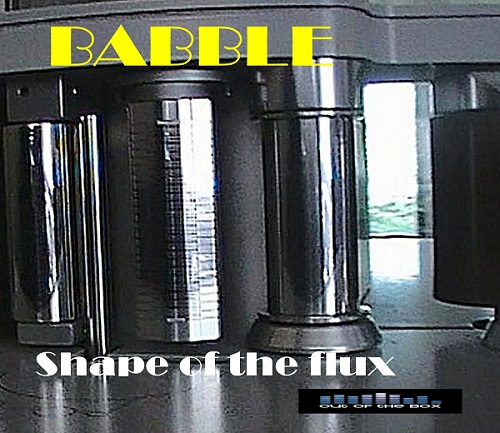 babəl). È incredibile che lavoriamo e stiamo insieme da 30 anni! Non sembra così tanto! Abbiamo avuto un figlio e avevo un altro figlio dal mio matrimonio. In quegli anni ci sono stati momenti meno produttivi ma anche se non suonavamo dal vivo abbiamo comunque registrato molte cose. Mi stavo ammazzando di lavoro subendo un attacco di cuore nel 2004 mentre suonavo con un’altra band in giro per tutto il paese, inoltre abbiamo perso la nostra casa… fin troppo! Mi ci sono voluti alcuni anni per riprendermi. Abbiamo ricominciato ad esibirci seriamente insieme nel 2012 con lo spettacolo e l’album “Bread and Circuses”. Non siamo mai stati così interessati a cercare di ottenere un enorme successo – ci ho provato negli anni ’80 realizzando solo lunghi tour per molte band – facciamo quello che sappiamo fare meglio e questo sembra evolversi costantemente. Siamo così felici di aver attratto molti fan in tutto il mondo che cercano qualcosa di diverso. Siamo un pò una band ‘Marmite’: o la ami o la odi! Siamo anche molto appariscenti nelle nostre esibizioni dal vivo!!
babəl). È incredibile che lavoriamo e stiamo insieme da 30 anni! Non sembra così tanto! Abbiamo avuto un figlio e avevo un altro figlio dal mio matrimonio. In quegli anni ci sono stati momenti meno produttivi ma anche se non suonavamo dal vivo abbiamo comunque registrato molte cose. Mi stavo ammazzando di lavoro subendo un attacco di cuore nel 2004 mentre suonavo con un’altra band in giro per tutto il paese, inoltre abbiamo perso la nostra casa… fin troppo! Mi ci sono voluti alcuni anni per riprendermi. Abbiamo ricominciato ad esibirci seriamente insieme nel 2012 con lo spettacolo e l’album “Bread and Circuses”. Non siamo mai stati così interessati a cercare di ottenere un enorme successo – ci ho provato negli anni ’80 realizzando solo lunghi tour per molte band – facciamo quello che sappiamo fare meglio e questo sembra evolversi costantemente. Siamo così felici di aver attratto molti fan in tutto il mondo che cercano qualcosa di diverso. Siamo un pò una band ‘Marmite’: o la ami o la odi! Siamo anche molto appariscenti nelle nostre esibizioni dal vivo!!
Karen (B) Sì! All’inizio stavano accadendo parecchie cose per me a livello personale. Ero stata al college a Bath facendo Performing Arts, cantando  molto in diversi combo jazz, acapella, blues ecc. Sono tornata a Bristol e ho incontrato il fratello di Rob, che è un attore, e sono stata coinvolta in un progetto di danza e musica. Da quel primo incontro con Rob come chitarrista nel progetto, mi sono unita alla sua band The Altar Boys, che ha subito cambiato nome in Babble. Avevo la sensazione che tutto sarebbe andato oltre quella band per effetto della chimica musicale che reagiva intorno a noi.
molto in diversi combo jazz, acapella, blues ecc. Sono tornata a Bristol e ho incontrato il fratello di Rob, che è un attore, e sono stata coinvolta in un progetto di danza e musica. Da quel primo incontro con Rob come chitarrista nel progetto, mi sono unita alla sua band The Altar Boys, che ha subito cambiato nome in Babble. Avevo la sensazione che tutto sarebbe andato oltre quella band per effetto della chimica musicale che reagiva intorno a noi.
La musica dei Wise Children è fatta di momenti spaziali sperimentali accattivanti e fluidi guidati dalla voce e dai testi taglienti di Karen. Poi con Babble prende una piega diversa. C’è più ritmo e luce. È più tribale con sensazioni funky pur rimanendo centrata sui testi e sulla voce di Karen. Come si è sviluppato il vostro suono nel corso degli anni e cosa ascoltavate in quel momento?
Rob (B) Uso sintetizzatori per chitarra dal 1992, originariamente con un Takamine elettroacustico e la mia fedele Ibanez Roadstar elettrica (modello Steve Lukather). Le canzoni erano più costruite allora, di solito partendo da un’improvvisazione. Poi scrivevo e registravo la musica e la passavo a Karen. Negli ultimi anni tendiamo ad improvvisare insieme come facevamo in passato con Jon e Paul al basso e poi a lavorare sui pezzi che risaltano 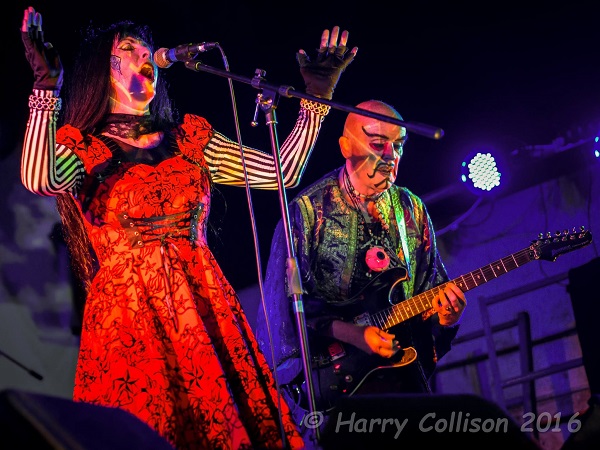 davvero. Ho sempre amato una vasta gamma di musica – quindi trovo difficile la domanda su cosa stavo ascoltando in quel momento – ero molto interessato alla buona fusione jazz/rock, in particolare John McLaughlin e Weather Report come esempi, Jeff Buckley era un genio e scomparso prematuramente, Hendrix mi ha lasciato senza fiato in tenera età come hanno fatto i Cream.
davvero. Ho sempre amato una vasta gamma di musica – quindi trovo difficile la domanda su cosa stavo ascoltando in quel momento – ero molto interessato alla buona fusione jazz/rock, in particolare John McLaughlin e Weather Report come esempi, Jeff Buckley era un genio e scomparso prematuramente, Hendrix mi ha lasciato senza fiato in tenera età come hanno fatto i Cream.
Karen (B) Wise Children erano molto lirici e sperimentali in modi diversi. Ho fatto appello a molte influenze jazz/blues così come a canti più eterei e tribali. Rob ed io stavamo anche partecipando a molti concerti, persone come Trilok Gurtu, Arthur Brown, David Byrne, Tori Amos – così tanti artisti fantastici differenti da cui trarre ispirazione! E poi ascoltando anche una vasta gamma di musicisti dalla musica classica, a Zappa, Beefheart, Sinatra, Bessie Smith, Bjork, Weather Report – solo per citarne alcuni.
 Ci sono delle band che vi hanno influenzato maggiormente nel plasmare il vostro sound? Qualcosa che negli anni ha caratterizzato una serie di mutazioni abbracciando la maggior parte dei generi musicali…
Ci sono delle band che vi hanno influenzato maggiormente nel plasmare il vostro sound? Qualcosa che negli anni ha caratterizzato una serie di mutazioni abbracciando la maggior parte dei generi musicali…
Rob (B) Robert Fripp e King Crimson hanno avuto una grande influenza, Talking Heads, Adrian Belew che è stato in entrambe queste band e David Bowie. Di un genere completamente diverso, amo Richard Thompson: è unico.
Karen (B) Personalmente, sono influenzata da tutti i suoni e dal canto ritmico, da cose selvagge e folli fuori dagli schemi. Sono cresciuta con Sinatra, Tony Bennett, Matt Monroe grazie a mio padre, che aveva una grande voce (era solito stupire sulle navi da crociera) e poi Wishbone Ash, Beatles, Pink Floyd, Jethro Tull, Lindisfarne, Genesis (i primi con Peter Gabriel – una grande influenza) grazie a mia sorella. La mia più grande e continua fonte ispirativa è David Bowie che ho visto diverse volte. Voci che hanno ‘cuore’: Tom Waits, Captain Beefheart, David Thomas (Pere Ubu), Kate Bush, Meredith Monk, Diamanda Galas, Grace Slick, Janis Joplin, Ian Dury. Band come The Editors con la bella voce soul di Tom Smiths. Ci sono così tanti grandi musicisti nel mondo. Mi piace assaggiare tutto. Oh, e Gil Scott-Heron, un’enorme influenza su di me.
 Anche percependo le vostre influenze, BABAL non possono essere facilmente etichettati. Molto eclettici e in continua evoluzione con ogni disco. Sempre alla ricerca di nuove idee ed elementi che facciano risplendere il suono. Quanto tempo dedicate a lavorare su una canzone, come sviluppate musica e testi?
Anche percependo le vostre influenze, BABAL non possono essere facilmente etichettati. Molto eclettici e in continua evoluzione con ogni disco. Sempre alla ricerca di nuove idee ed elementi che facciano risplendere il suono. Quanto tempo dedicate a lavorare su una canzone, come sviluppate musica e testi?
Rob (B) Di solito iniziamo improvvisando insieme e spesso con Jon e Paul. Essendo tutto registrato su tracce separate ho poi la possibilità di combinare la musica intorno alla voce e ai testi di Karen, a volte togliendo tutta la strumentazione originale e sostituendola con un arrangiamento che si evolve e cambia con Jon che ri-registra abbastanza spesso la batteria. La voce di Karen è di solito così forte e sorprendente che non c’è bisogno di provare a riprodurla in modo che la sua voce e i suoi testi diventino una solida base di ogni canzone. Lei aggiunge anche delle armonie in seguito se lo ritiene necessario ed interviene ampiamente nelle fasi di missaggio e mastering. Registriamo tutte le canzoni nel nostro studio casalingo e poi le portiamo in un fantastico studio di ingegneri per modificare i suoni e infine mixarle e masterizzarle quando sarà il momento. Quindi, dedichiamo molto tempo a sviluppare la canzone come vogliamo che suoni, ma la creazione iniziale è istantanea attraverso l’improvvisazione.
Karen (B) Il tempo su una canzone diciamo che si evolve. Colgo le parole in fretta, a volte quando mi sveglio provenienti da un mio sogno. Di solito si fissano immediatamente. Più tardi, quando riesco ad abbinare i testi ad un brano musicale che Rob ha composto, posso cambiare leggermente il 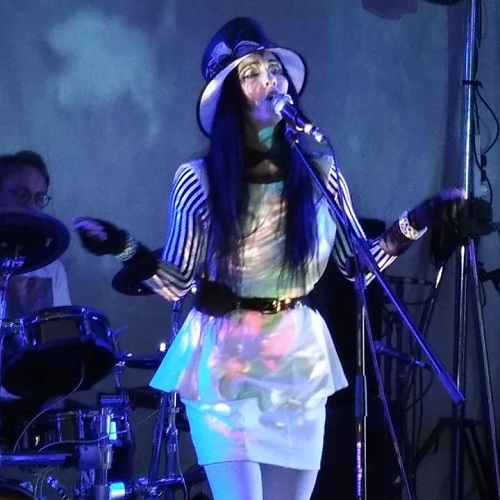 fraseggio nel canto o ripetere il motivo, ma l’essenza del testo della canzone rimane la stessa. L’idea guida la canzone e la sua forma. Si piega intorno alla musica. Inoltre, le canzoni provengono direttamente dall’improvvisazione come band, e altrettanto spontaneamente le interpreto. Possono essere necessarie settimane/mesi prima che la canzone venga finalizzata nelle sessioni di produzione e studio. Le mie canzoni di solito sono prosa/poesie che diventano canzoni. Poi ci vengono le idee su come la musica e le parole siano funzionali alla canzone. Potrei ritenere che sia meglio essere più blues o con un margine più hard; Rob ascolta davvero il modo in cui presento i testi e il fraseggio nel canto e intreccia sempre la musica attorno alla “sensazione” a cui sto mirando. Inoltre, la batteria di Jon può ispirare una sensazione particolare e cambiare anche la direzione.
fraseggio nel canto o ripetere il motivo, ma l’essenza del testo della canzone rimane la stessa. L’idea guida la canzone e la sua forma. Si piega intorno alla musica. Inoltre, le canzoni provengono direttamente dall’improvvisazione come band, e altrettanto spontaneamente le interpreto. Possono essere necessarie settimane/mesi prima che la canzone venga finalizzata nelle sessioni di produzione e studio. Le mie canzoni di solito sono prosa/poesie che diventano canzoni. Poi ci vengono le idee su come la musica e le parole siano funzionali alla canzone. Potrei ritenere che sia meglio essere più blues o con un margine più hard; Rob ascolta davvero il modo in cui presento i testi e il fraseggio nel canto e intreccia sempre la musica attorno alla “sensazione” a cui sto mirando. Inoltre, la batteria di Jon può ispirare una sensazione particolare e cambiare anche la direzione.
Karen, i tuoi testi sono molto forti, politici e sensibili. Abbracciano un mondo di argomenti diversi. Come autrice c’è una poetessa, una cantante, un’attivista politica donna a cui ti piace essere paragonata? Hai uno spirito affine?
Karen (B) I miei testi riflettono i miei pensieri e sentimenti/esperienze; lo hanno sempre fatto e sempre lo faranno. Sono una persona emotivamente viscerale! Tuttavia, l’intensità e le sfumature del linguaggio sono davvero importanti per me. Così come una buona parolaccia ogni tanto. Ma non scrivo mai canzoni d’amore. Non è un genere che mi interessa. Attiviste? Bene, Patti Smith si distingue per me come una donna iconica; la vita delle persone è una forma di attivismo. Essere contro la disuguaglianza, la noia, il conformismo, i sistemi e le persone narcisistiche ecc… è un atto politico. Tony Benn (politico socialista britannico) è stata un’altra voce ispiratrice (l’ho incontrato due volte, uomo fantastico). Chiunque debba essere vulnerabile e allo stesso tempo duro di fronte alle avversità è un attivista. Non ho tempo da perdere per i Tories e le persone di destra: sono dei fanatici idioti e hanno bisogno di essere controllati, ma non è utile lasciarsi coinvolgere dai loro giochi mentali che sprecano la tua preziosa energia. La natura è il mio spirito  affine in tutte le cose: umani, animali, alberi, piante, il mare, gli elementi.
affine in tutte le cose: umani, animali, alberi, piante, il mare, gli elementi.
Se dovessi ripercorrere i tuoi testi dall’inizio fino ad ora, come li definiresti?
Karen (B) Non li definirei. Lascio alle persone decidere cosa pensano che le canzoni significhino per loro, come li influenzano personalmente.
Qualche anno fa, la tua vita, e quella di Rob, è stata sconvolta da una malattia molto crudele dalla quale ora sei guarita. Hai avuto un cancro al sangue. Per chi non subisce tutto questo non è facile capire cosa prova dentro la persona ammalata. Cosa ti ha aiutato ad andare avanti?
Karen (B) Non mi sono mai definita in base alla mia esperienza con il cancro (o alla mia esperienza come alcolista a 34 anni). Naturalmente, queste cose cambiano la vita; sarebbe puerile ignorare la loro influenza. Tuttavia, ‘Spirit in a Meat Suit’ (la title track) mette davvero queste cose al posto giusto per me. Siamo temporanei, assuefatti, solo spiriti in balia di se stessi… Il cancro è messo troppo in alto come la cosa peggiore che possa accadere. Ho perso amici a causa delle sue varie forme in periodi di tempo brevi e prolungati (e mi dispiace davvero anche per la tua perdita). Ho affrontato la mia morte, e anche quella di Rob, ma poi affrontiamo la nostra morte ogni minuto di ogni giorno! Noi tutti lo facciamo! Ho sicuramente capito chi mi ha davvero compreso quando ho avuto il cancro: quelle persone che non hanno avuto pietà di me e che hanno anche dato un aiuto pratico. Gli amici del bel tempo e quelle persone che non potevano affrontare la propria mortalità sono semplicemente svanite. Va bene, non giudico; siamo tutti  umani, ma ha chiarito le cose. C’è un mondo pre e post cancro! Sia per il malato che per gli accompagnatori/amici. Mia figlia è stata fantastica in entrambe le nostre malattie. Mi ha insegnato una volta per tutte che non esistono cose come la sicurezza, e questo è liberatorio. E sì, il cancro lascia enormi buchi e dolore nella vita di molti.
umani, ma ha chiarito le cose. C’è un mondo pre e post cancro! Sia per il malato che per gli accompagnatori/amici. Mia figlia è stata fantastica in entrambe le nostre malattie. Mi ha insegnato una volta per tutte che non esistono cose come la sicurezza, e questo è liberatorio. E sì, il cancro lascia enormi buchi e dolore nella vita di molti.
In quel periodo avete realizzato ‘Liquid Sunshine’ un lungo strumentale di suoni eterei e cosmici pubblicato in free download sul vostro sito Bandcamp e presentato come ‘our gift to help you de-stress’. Ce ne potete parlare?
Rob (B) ‘Liquid Sunshine’ è un pezzo ambient improvvisato che ho fatto quando Karen era nel mezzo del suo trattamento di chemio. La frase è stata presa da un libro scritto da un famoso oncologo americano che ha paragonato la chemio al sole liquido: la sua forza spazza via tutte le cose brutte, ma è potente come il sole che può anche bruciarti e farti del male! Vederlo come una forza curativa ci piaceva: il suo argomento era che se vivi nella speranza sopravviverai, se rinunci alla speranza allora sei finito…
Karen (B) ‘Liquid Sunshine’! Un altro nome per i miei trattamenti chemioterapici Nordic Protocol!!!! Un cocktail infernale di componenti che uccidono le cellule. Chiamarlo ‘Liquid Sunshine’ lo ha trasformato in un elisir positivo e che afferma la vita.
Rob, c’è un chitarrista che vedi come un’influenza primaria nella tua musica?
Rob (B) Difficile rispondere con un nome – mi vengono in mente Fripp, Belew, Hendrix, Steve Vai, David Torn, John Mclaughlin, Al di Meola
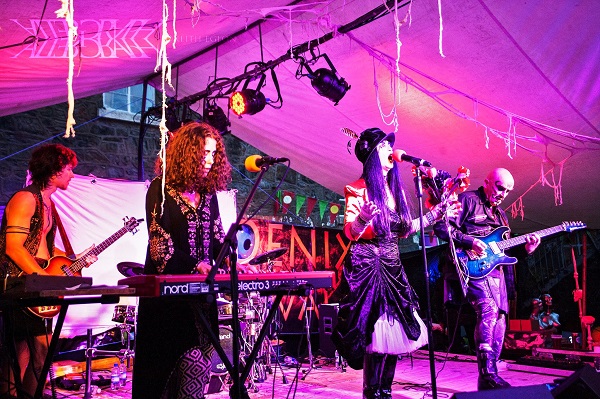 In alcuni dei vostri dischi partecipano diversi musicisti. Come nascono queste collaborazioni?
In alcuni dei vostri dischi partecipano diversi musicisti. Come nascono queste collaborazioni?
Rob (B) È sempre bello lavorare con altre persone, a volte può essere rigenerante! Paul Smith è stato una costante al basso e appare spesso nei nostri album. Ci rivolgiamo a molti bassisti per un suono di qualità necessario nel lavoro dal vivo. Abbiamo fatto molti concerti con Ben Balsom (basso) e Zoie Green (tastiere), quindi ci è sembrato giusto coinvolgerli nell’album “The Circle of Confusion of Tongues” e in alcuni brani degli EP. Sono ottimi giovani musicisti che in precedenza erano nella band di Alan Davey (ex Hawkwind) Psychedelic Warlords così come Craig High che ha suonato il sopranino in “He’s Got the Bends” su “TCOCOT”. Anche Craigus Barry (chitarra) era con noi su “Hanging In the Balance” EP. Abbiamo anche avuto un’incredibile violinista Sarana Verlin (insignita nella Detroit Music Hall of Fame) che ha suonato sull’EP “Frank’s Lament”.
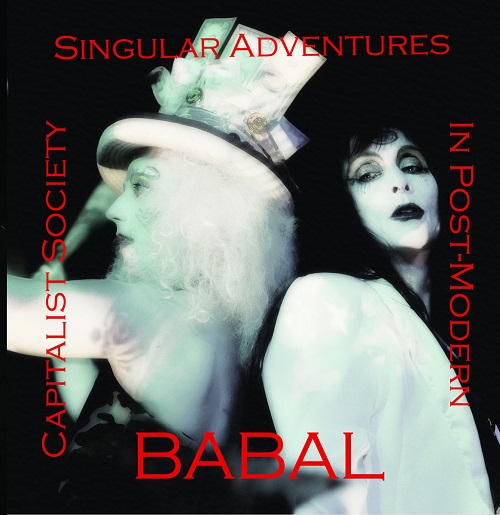 Quale album considerate cuore ed anima di BABAL, e quale definireste il più strano musicalmente e liricamente?
Quale album considerate cuore ed anima di BABAL, e quale definireste il più strano musicalmente e liricamente?
Rob (B) Penso che sarebbe “Spirit In A Meat Suit” poiché racchiudeva tutto ciò che stavamo passando con il cancro. Immagino che la cosa più strana potrebbe essere “Singular Adventures in Post-Modern Capitalist Society” – all’epoca avevamo firmato con la Dgenerate records e loro volevano davvero un suono grezzo molto più essenziale, quindi abbiamo pubblicato l’EP “Hanging in The Balance” che ha tracce infernali come “Speed”. Invece l’album “Singular Adventures….” era molto più sperimentale e l’abbiamo pubblicato noi stessi. Includerei anche “Glossolalia” che era roba strana inedita!
Karen (B) “Shape of the Flux” è, dal punto di vista dei testi, uno dei miei preferiti, anche se “The Circle of Confusion of Tongues” credo sia BABAL in cima al nostro gioco. Sento che è un picco per la mia arte come cantante/cantautrice, e ha così tanta forza e arguzia nella voce e nella musica. Tuttavia, “Spirit in a Meat Suit” contiene così tanta voce della mia anima che non posso davvero scegliere. Sono tutti validi! Musicalmente, ogni album/EP produce stati d’animo diversi mentre lo ascolto di nuovo. Adoro “The Glacier” EP, ad esempio, con le lugubri battute iniziali del bellissimo 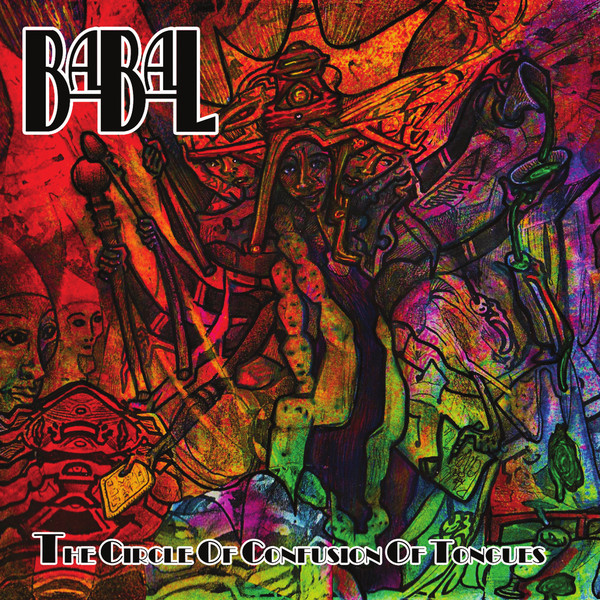 violino di Sarana Verlin.
violino di Sarana Verlin.
Chi progetta le grafiche delle copertine? Le grafiche del vostro ultimo lavoro “Spirit in a Meat Suit” sono notevoli. Lavorate insieme all’artista con le vostre idee?
Rob (B) L’artista che ha disegnato le copertine per l’album “The Circle of Confusion of Tongues”, l’EP “The Glacier”, l’EP “Frank’s Lament” e l’album “Spirit in a Meat Suit” è Paul Kopal – adoriamo le sue cose ed è molto prolifico – noi abbiamo scelto queste opere d’arte mentre ci parlavano e ci siamo sentiti connessi a ciò che stavamo trasmettendo nella musica. Lasciamo sempre che l’arte parli da sola piuttosto che definire ciò che vogliamo – lo stesso con l’artista psichedelico Andy White che ha prodotto il disegno per la copertina dell’EP “The Big Everything” e Glen Tomney per la copertina di “Dreams For Imaginary Puppet Shows on the Radio”
Karen (B) Artwork; molto importante. La qualità intricata e onirica del lavoro di Paul Kopal mi ha sempre impressionato. Andy White è il nostro punto di riferimento per i colori e il caos psichedelico che distorcono la mente! Russ Brown è un favoloso artista futuristico e Glen Tomney è il re del collage 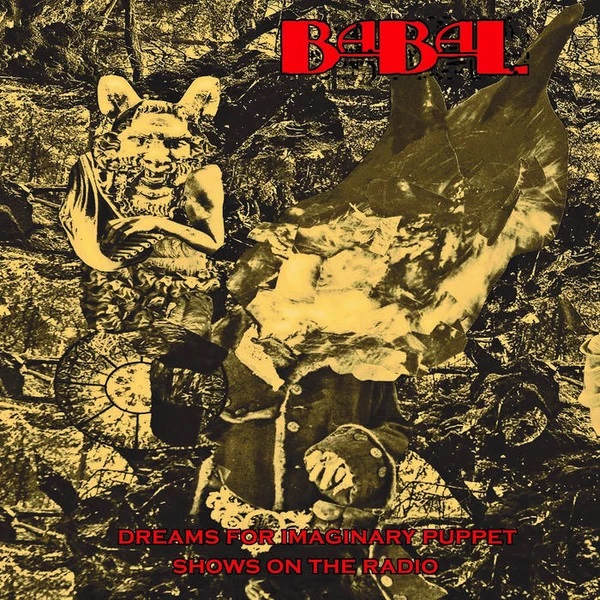 surreale, oscuro e delle stranezze visive. Tutti diversi ma formando collettivamente una parte importante dell’espressione della vita BABAL.
surreale, oscuro e delle stranezze visive. Tutti diversi ma formando collettivamente una parte importante dell’espressione della vita BABAL.
La maggior parte dei vostri dischi è uscita su Melodic Revolution Records l’etichetta discografica gestita da Nick Katona e con sede in Florida USA. Alcuni altri tramite Out of The Box Records e Degenerate Records…
Rob (B) Nick segue la band dal 2012 ma abbiamo firmato per MMR solo nel 2018 a causa di altri impegni. Inoltre, ci sono album che abbiamo pubblicato noi stessi sulla nostra etichetta Ineffable.
Le vostre esibizioni dal vivo hanno elementi teatrali e sono anche piuttosto spettacolari. Volti dipinti, costumi, atteggiamenti scenici di grande impatto. A chi si ispirano, ce ne parlate?
Rob (B) Ci sono sempre piaciute molto le band con un forte elemento visivo così come la grande musica – anche l’elemento del teatro grand guignol, del music hall e dei vecchi film – band come Arthur Brown ma anche i Residents, i Devo, i Tubes, i 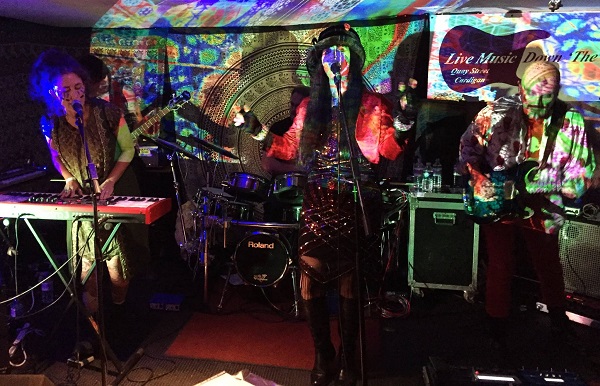 Sensational Alex Harvey Band per citarne alcuni. Entrambi abbiamo lavorato in formati multimediali in passato, quindi quando l’identità di BABAL è diventata più forte è sembrata una progressione naturale piuttosto che essere sul palco con indosso magliette e jeans.
Sensational Alex Harvey Band per citarne alcuni. Entrambi abbiamo lavorato in formati multimediali in passato, quindi quando l’identità di BABAL è diventata più forte è sembrata una progressione naturale piuttosto che essere sul palco con indosso magliette e jeans.
Karen (B) BABAL live è stato un viaggio molto teatrale – sono sempre stata ispirata dal mimo/faccia bianca; il mio film preferito del regista francese Marcel Carne “Les Enfants du Paradis” ha sempre fatto parte della mia “mente” artistica. Con il leggendario mimo Jean-Louis Barrault (che insieme a Marcel Marceau ha anche influenzato Bowie). Anche Lon Chaney, l’attore muto “l’uomo dai mille volti” ha un posto speciale; il bathos, il pathos, la danza del viso e i gesti del corpo. Anche Buster Keaton, il “grande volto di pietra” figura nel mix. Mae West (per arguzia e battute e pura eleganza), Monroe, Pina Bausch, Martha Graham, tutto il mondo del cinema; per me il massimo potere narrativo del 20° secolo (e, si spera, 21°). Molti maestri… Oh, e senza dimenticare i Fratelli Marx per l’assurdo, il maniacale, lo 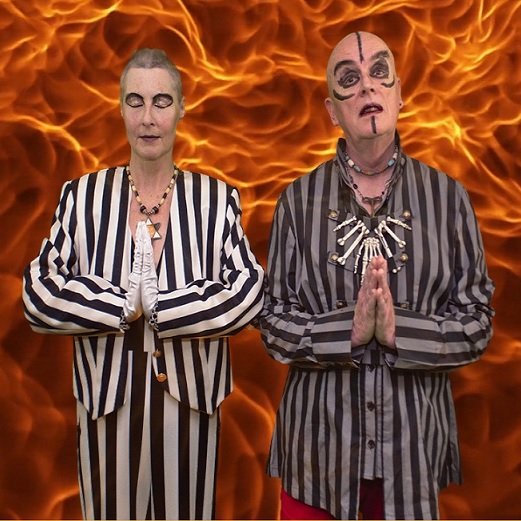 schiaffo e l’insensatezza. La tristezza, la follia e l’allegria dei filosofi clown vedranno la fine del mondo in rovina…
schiaffo e l’insensatezza. La tristezza, la follia e l’allegria dei filosofi clown vedranno la fine del mondo in rovina…
E il mondo BABAL come procederà?
Rob (B) Attualmente stiamo lavorando su nuovo materiale per il nostro prossimo album che sarà potente! Abbiamo in programma di esibirci di nuovo nel 2022: il nostro ultimo concerto è stato a giugno 2018 poco prima che il cancro di Karen prendesse il sopravvento.
Karen (B) Sì, sempre seguendo, andando avanti, mantenendo il flusso and the music bubbling… Il ridicolo, lo sbagliato, il beffardo, il buono, il muto, l’arrabbiato, l’arrogante, l’audace, l’avido, il bello, THE BIG EVERYTHING! Niente va oltre la fucina di idee perché tutto ha bisogno di entrare nel pot-pourri politico, educato, polarizzato, profumato, paranormale che è la nostra esistenza quotidiana! Quindi non la vedo come una “prossima cosa”, più una traccia in corso per il treno di pensieri di BABAL. Tutto bene e come dovrebbe essere… Oh e le esibizioni dal vivo l’anno prossimo, ovviamente. Amore e pace.
DISCOGRAPHY
WISE CHILDREN
“Collaborating with the Inevitable” (CD, Ineffable, 1999)
“The Law of 3” (CD, Ineffable, 2001)
BABBLE
“Shape of the Flux” (CD, Out of the Box, 2012)
“Bread and Circuses” (CD, Out of the Box, 2012)
BABAL
“Babal Present: Bread & Circuses” (DVD, Live at the Brewery Arts Centre, 30th November 2013)
“Hanging in the Balance” (CDEP, Dgenerate, 2015)
“Singular Adventures In Post-Modern Capitalist Society” (CD, Ineffable, 2016)
“Glossolalia 1993 – 2018” (CD, Ineffable, 2018)
“The Circle of Confusion of Tongues” (CD & LP, Melodic Revolution Records, 2018)
“The Glacier” (CDEP, Melodic Revolution Records, 2018)
“The Big Everything” (CDEP, Melodic Revolution Records, 2019)
“Frank’s Lament” (CDEP & 12″EP, Melodic Revolution Records, 2020)
“Dreams For Imaginary Puppet Shows on the Radio” (CD, Melodic Revolution Records, 2020)
“Spirit in a Meat Suit” (CD, Melodic Revolution Records, 2021)

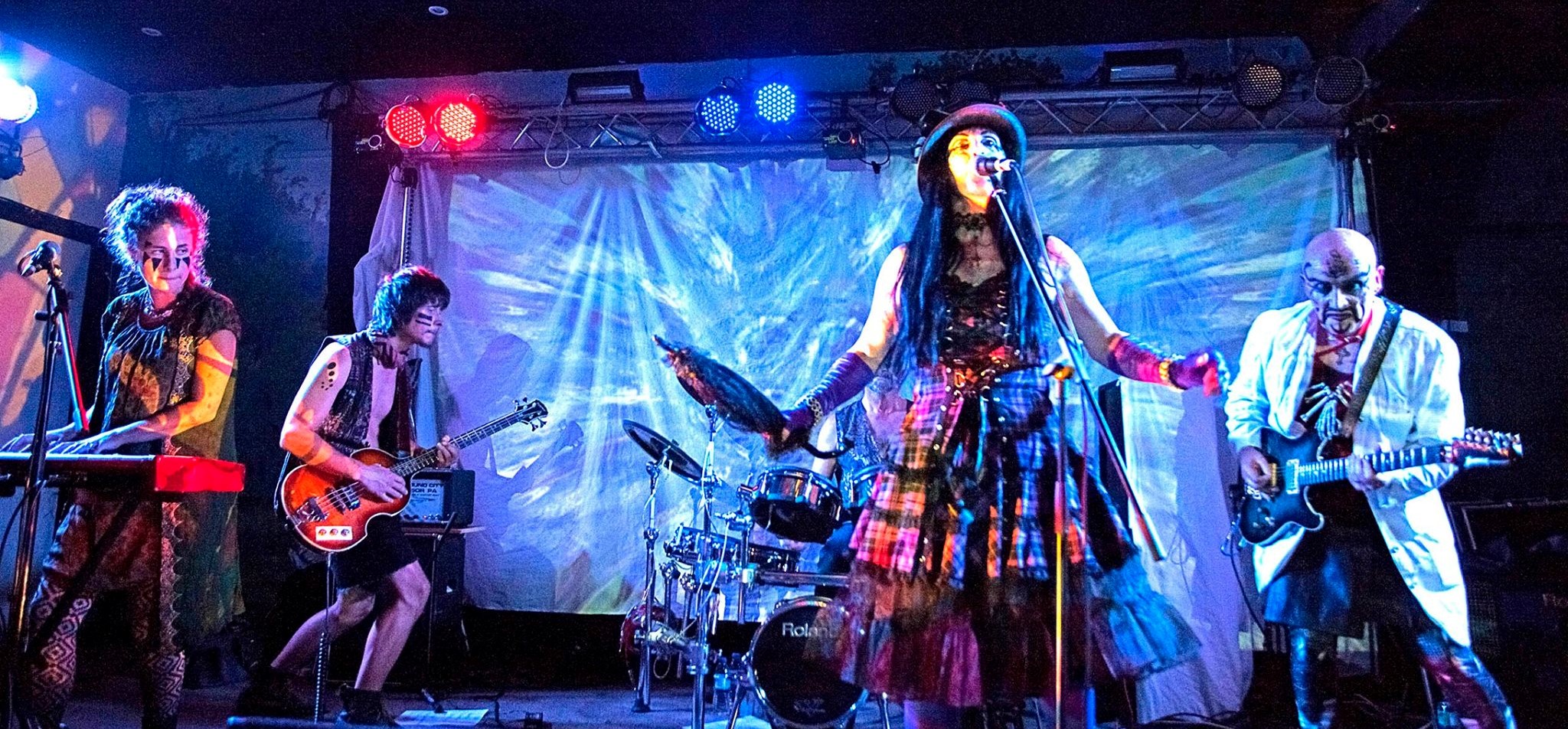

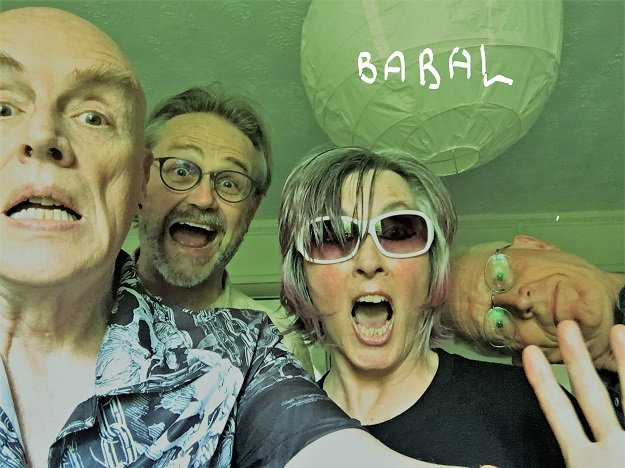
English translation…
BABAL
THE DYSTOPIAN TALES OF THE PSYCHEDELIC THEATER
by Domenico Caccamo and Giampiero Fleba
Music, lyrics, visual art. Three parts of a living body to access the gaze of underground psychedelic rock. A listening experience where you can immerse yourself freely as if you were going to see a movie. Protagonist: BABAL, a powerful British vibe, a whole of sounds, words, symbolism and theater. Incredible live and equally expressive on record with impressive album artworks, a high sonic density between spatial frequencies and post-progressive aptitude to challenge the concept of musical genre with a creative fusion that flows like a unique perception. It is above all the artistic vision of Karen Langley (voice and lyrics) and Rob Williams (guitar and music), a couple in life and creators of a project active since the early 2010s. A journey that begins in the 90s with various collaborators and experiences from Wise Children to Babble, the first incarnation of BABAL, creators of “Shape of the Flux” (2012) and “Bread and Circuses” (2012). The albums “Singular Adventures in Post-Modern Capitalist Society” (2016) and “The Circle of Confusion of Tongues” (2018 – initial part of the homonymous trilogy) are the first powerful BABAL excursions into vibrant territories of guitars and keyboards, propulsive grooves, ethereal cosmic scenarios. Dynamism in motion that adds suggestions to the perspective with videos of great expressiveness such as ‘Speed’, ‘Endless Re Run Society’, ‘Dreams for Imaginary Puppet Shows on the Radio’, ‘The Circle of Confusion of Tongues’ and ‘Dead Center’. The music amplifies the meaning of the lyrics and vice versa like a voice that exclaims to be heard in a world gone mad with the album “Spirit in a Meat Suit” (2021) and the digital track ‘Zombie Diary’, very recent achievements of a nourished discography (including the 2015 EP “Hanging in the Balance”, one of the first reviews of Plenirockium). An intense story and also of great inner strength that Karen and Rob passionately tell us…
The very early nucleus of BABAL goes way back in 1993 when you both start recording your first demo tapes gathering all your music ideas. Six years later, in 1999, all come to life with the addition of your long time collaborator Jon Sharp on drums. You released two records as Wise Children and further more as Babble. What can you tell us about the beginning of your music experience. How it all started and what you had in mind. Did you ever think that you would go as far as now?
Rob (B) We met in 1992 when a friend of ours was putting together an experimental dance/music experience “The Cauldron of Colours”, from that we thought we could work together and started to improvise ideas together on a 4 track Teac cassette recorder. I had already worked with Jon in another project and also our long time bass friend Paul Smith and we started to improvise with them – we recorded a whole lot of improvised pieces in a pro studio – “The Mr. Grin tapes” which has never been released…..
I was going through a break up of my marriage and more and more gravitated towards Karen – we became soul mates on many levels.
In terms of what we had in mind – it just evolved through creating – we have always been very independent and following our own path which I think is why we have always been hard to categorize.
We started off as Wise Children, changed the name to Babble then later realized there was already a band with that name who were quite well known so we became BABAL (still pronounced the same as babble)
It’s amazing we have been working and being together for 30 years! Does not seem that long! During those years there were times when we did very little – having a baby together, plus I had a young son from my marriage, but even though we did not play live we still recorded many things. I had a heart attack in 2004 – burning the candle at both ends – I was playing in a band for money at the time and was gigging all over the country plus we lost our home – all too much. Took me a few years to recover from that…
We started performing seriously together again in 2012 with the Bread and Circuses show and album.
We have never been that interested in trying to gain massive success – I tried that in the 80’s and ended up doing session work for a lot of touring bands – we do what we do and that seems to evolve constantly. We are so happy that we have attracted many fans all over the world who are looking for something different. We are a bit of a Marmite band – you either love it or hate it! We also are very visual in our live performances!!
Karen (B) Yes! Early days; so much was happening for me on a personal level; I’d been at college in Bath doing Performing Arts, lots of singing in different combos, jazz, acapella, blues etc. I returned to Bristol and met up with Robs brother, who is an actor, and got involved in a dance/music project. From that initial meeting with Rob as guitarist in the project, I went on to front Robs band “The Altar Boys”, which quickly had a name change to “Babble” when I joined. I had an inkling that it would go further than just another band because of the musical chemistry that was in the room from the word go.
The music you produced with Wise Children was made of flowing captivating experimental spacey moments driven by the voice and sharp lyrics of Karen. Not far long you ‘reinvent’ yourself as Babble and your music takes a different turn. There is more rhythm and light. It’s more tribal with funky feels, but the main ingredients, Karen lyrics and voice are always there to catch the listeners attention. How your sound developed through the years and what was way back then your most listening pleasure?
Rob (B) I have been using guitar synthesizers since 1992 – originally using a Takamine electro acoustic and my trusty electric Ibanez Roadstar (Steve Lukather model). The songs were more constructed then but usually from an improvisation, usually by me writing and recording the music and passing it to Karen. Over the last years we tend to improvise together as we used to in the past with Jon and Paul on bass and then work on the bits that really stand out. I have always loved a wide range of music – so I find that question what I was listening to at the time difficult – I was very much into good jazz/rock fusion particularly John McLaughlin and Weather Report as examples, Jeff Buckley was a genius and untimely plucked, Hendrix blew me away at an early age as did Cream.
Karen (B) Wise Children was very lyrical and experimental in many ways, and I called on a lot of jazz/blues influences as well as more ethereal and tribal singing. Rob and I were attending lots of gigs too, people like Trilok Gurtu, Arthur Brown, David Byrne, Tori Amos – so many different amazing artistes to be inspired by! And listening also to a huge range of musicians from classical, to Zappa, Beefheart, Sinatra, Bessie Smith, Bjork, Weather Report – to name but a very few.
Are there any bands that most influenced you to shape your sound? A sound that through the years went into various mutations. You really embraced most of the music genres…
Rob (B) Robert Fripp and Crimson has been a big influence, Talking Heads, Adrian Belew who has been in both these bands as well as David Bowie. From a different genre entirely, I love Richard Thompson – he is an original.
Karen (B) Personally, I am influenced by all sounds and rhythmic singing, and by wild, crazy “out there” stuff. I was brought up on Sinatra, Tony Bennett, Matt Monroe via my Father, who had a great voice (he used to wow the cruise ships) and then Wishbone Ash, Beatles, Floyd, Tull, Lindisfarne, Genesis (early with Peter Gabriel – a huge influence) via my sister. The biggest and continuing single influence has to be Bowie who I saw several times. Voices that have “heart”; Tom Waits, Beefheart, David Thomas (Pere Ubu), Kate Bush, Meredith Monk, Diamanda Galas, Graces Slick and Jones, Ian Dury. Bands such as “The Editors” featuring Tom Smiths’ beautiful soulful voice – there are just so many great musicians in the World. I like to sample them all. Oh, and Gil Scott-Heron, a massive influence on me.
BABAL music, although the influences are there, it can’t be easily pigeonholed. You’re very eclectic and always evolving with every record. Always searching for new ideas and elements that make your sound shine. How much time your spend to work on a song, how do you develop music and lyrics?
Rob (B) We usually start off by improvising together and often with Jon and Paul – as everything is recorded on separate tracks it then gives me scope to arrange the music around Karen’s voice and lyrics – I have sometimes taken out all the original instrumentation and replacing it with an arrangement that evolves and changes with Jon quite often re-recording the drums. Karen’s vocal is usually so strong and amazing there is no need to try and reproduce it so that her voice and lyrics becomes the rock within each song. She will often add harmonies later if she feels it is needed. She also has a big hand inthe final arrangement, mixing and mastering the music. We record all the songs in our home studio and then take it to an amazing engineer’s studio to tweak the sounds and finally mix and master it when the time comes. So, we spend a lot of time on getting the song to what we want it to sound like but the initial creation is instant through improvisation
Karen (B) Time on a song; let’s say it evolves. I get words in a rush, sometimes when I wake up, just in my dreamtime. They usually gel immediately. Later when I can match them to a piece of music that Rob has composed, I may change the phrasing slightly or do repeat hooks, but the essence of the song lyric stays the same. The idea drives the song and the shape of it. It folds around the music. Also, songs come directly through improvisation as a band, and I keep the lyric and phrasing as it has spontaneously happened. It can take weeks/months for the song to then be finalized in production and studio sessions.
My songs are usually prose/poems that grow into songs. We then get ideas as to how the music and words best serve the song – I may feel it best to be more bluesy or with a harder edge; Rob really listens to the way I present lyrics and phrasing and always weaves the music around the “feel” I am aiming for. Also, Jon’s drumming will inspire a particular feel and change the direction too.
Karen, your lyrics are very strong, political and very sensitive. They embrace a world of different topics. As singer/songwriter is there a poetess, a singer, a female political activist you like to be compared to? Do you have a kindred spirit?
Karen (B) My lyrics reflect my thoughts and feelings/experiences; always have done, always will. I’m an emotionally visceral person! However, poignancy and nuance in language are really important to me. As is a good swear word now and again. But I never write love songs. It’s just not a genre I’m interested in. Activists? Well, Patti Smith stands out for me as an iconic woman; people’s lives are a form of activism. Being active against inequality, boredom, conformity, narcissistic systems and people etc is a political act. Tony Benn (British socialist politician) is another inspiring voice ( I met him twice, amazing man). Anyone who has to be vulnerable and yet tough in the face of adversity is an activist. I have no time left for Tories and right-wing people – they are time suckers and need to be watched but it’s not helpful to get drawn in to their mind games that waste your precious energy. Nature is my kindred spirit – in all things- human, animal, trees, plants, the sea, the elements.
If you have to go through your lyrics from the very beginning up to now, how would you define them? Would you file them into categories?
Karen (B) I wouldn’t define or categorize them. I leave it to people to decide what they think the songs mean to them, how they affect them personally.
Last year, your whole life, and Rob too, has been shattered,by a very cruel illness from whom you’re now recovered. You had blood cancer. Who doesn’t go through all this isn’t easy to understand what the person feel inside. What helped you move forward?
Karen (B) I’ve never defined myself by my cancer experience (or my experience as a recovering alcoholic of 34 years) Of course, those things are life-changing; it would be puerile to ignore their influence. However, ‘Spirit in a Meat Suit’ (the title track) really puts these things in their right-sized place for me. We are temporary, habit-forming, just spirits on our way…
Cancer is put way too high up as the worst thing that can happen. I’ve lost friends to its various forms over short and lengthened periods of time (and I really feel for your loss too). I’ve faced my own death, and Rob’s too, but then we face our own deaths every minute of every day! We all do! I definitely worked out who really ‘got’ me when I had cancer – those people who didn’t pity me, and who also gave practical help. Fair-weather friends and those people who just couldn’t face their own mortality just faded away. That’s OK. I don’t judge; we’re all human, but it clarified things. There’s a pre and post cancer world! Both for the sufferer and the carers/friends (my daughter was amazing throughout in both our illnesses).
It taught me once and for all that there is no such things as security, and that is liberating. And yes, cancer leaves massive holes and grief in the lives of many.
In that period you made ‘Liquid Sunshine’ a long instrumental of ethereal and cosmic sounds published in free download on your Bandcamp website and presented as ‘our gift to help you de – stress’. Can you tell us about it?
Rob (B) ‘Liquid Sunshine’ was an improvised ambient piece which I did when Karen was in the middle of her chemo treatment – the phrase was taken from a book written by a famous American oncologist who likened the chemo to liquid sunshine – the strength of it blasts all the bad stuff away but it is so strong like the sun that it can also burn and hurt you! But seen as a healing force which we liked – his argument was if you live in hope you will survive, if you give up hope then you are finished…
Karen (B) ‘Liquid Sunshine’! Another name for my Nordic Protocol chemotherapy treatments!!!! A hellish cocktail of cell-killing components. Calling it ‘Liquid Sunshine’ made it into a positive, life-affirming elixir.
Rob is there a guitarist that you see as a primary influence in your music?
Rob (B) Hard to answer with one name – Fripp, Belew, Hendrix, Vai, David Torn, John Mclaughlin, Al di Meola spring into my mind…
Apart from you, Karen and Jon, some of your records see the collaborations of other musicians. You’re a multi instrumentalist but still, on some records you feel the need to bring extra musicians to help you out in the studio. How comes?
Rob (B) Always good to work with other people, it can be refreshing at times! Paul Smith has been a constant on bass and often appears on our albums. We go through a lot of bass players for live work as some of them don’t have the chops – we did a lot of gigs with Ben Balsom (bass) and Zoie Green (keyboards) so it felt right to us that we used them on the “The Circle of Confusion of Tongues” album and some tracks on the Eps. They are excellent young musicians who previously were in Alan Davey’s (ex Hawkwind) band Psychedelic Warlords as was Craig High who played sopranino on “He’s Got the Bends” on “The Circle of Confusion of Tongues”. Also Craigus Barry (guitar) was with us on the “Hanging In the Balance” EP. We also had an amazing violinist Sarana Verlin (honored in the Detroit Music Hall of Fame) play on “Frank’s Lament” from the EP of that name.
In your opinion, which of BABAL’s album you consider as your heart and soul, and which one you define as the most strange musically and lyrically?
Rob (B) I think it would be “Spirit In A Meat Suit” as it encapsulated everything we were going through with the cancer. I guess the strangest could be “Singular Adventures in Post-Modern Capitalist Society” – we were signed with Dgenerate records at the time and they really wanted a much more stripped-down raw sound so we released the “Hanging in The Balance” EP which has hellish tracks like ‘Speed’. The “Singular Adventures…” album was much more experimental and we released that ourselves. I would also include “Glossolalia” as well which was unreleased weird stuff!
Karen (B) Albums; “Shape of the Flux” is lyrically one of my favourites, though “The Circle of Confusion of Tongues” I feel is BABAL at the top of our game; I feel it is a peak for my craft as a singer/songwriter, and it has so much punch and wit in the vocals and the music. However, “Spirit in a Meat Suit” has so much of my soul’s voice in it, that I really cannot choose. They are all good! Musically, each album/EP produces different moods as I re-listen. I adore “The Glacier” for example, with the mournful opening bars of Sarana Verlin’s beautiful violin playing.
Who design the art covers? What’s the idea behind them? Do you help the artist with your ideas on the design of them?
Rob (B) The artist who has designed the art covers for “The Circle of Confusion of Tongues” album, “The Glacier” EP, “Frank’s Lament” EP and “Spirit in a Meat Suit” album is Paul Kopal – we love his stuff and he is very prolific – we chose these pieces of art as they spoke to us and felt connected to what we were putting across in the music. We always let the art speak for itself rather than define what we want – same with the psychedelic artist Andy White who produced the art for the cover of “The Big Everything” EP and Glen Tomney for the cover of “Dreams For Imaginary Puppet Shows on the Radio” album
Karen (B) Artwork; highly important; the intricate, dreamlike quality of Paul Kopal’s work has always impressed me. Andy White is our go-to-guy for psychedelic mind warping colour and chaos! Russ Brown is a fabulous futuristic artist, and Glen Tomney is the king of surreal, dark collage and visual strangeness. All different; collectively forming a big part of the BABAL expression of life.
Most of your records came out via Melodic Revolution Records the record label run by Nick Katona and is based in Florida USA, Nick unceasingly promotes and presents MMR bands from all over the world and is eclectic in taste but encompasses the true meaning of progressive music rather than prog rock. Some others via Out of The Box Records and Degenerate Records.
Rob (B) Nick has been behind the band since 2012 but we only signed to MMR in 2018 due to other commitments. Also, there are albums we have put out ourselves on our own Ineffable label.
Your live performances have theatrical elements and are also quite spectacular. Painted faces, costumes, scenic attitudes of great impact. Who are they inspired by, can you tell us about them?
Rob (B) We have always really liked bands with a strong visual element as well as great music – also the element of grand guignol theatre, music hall and ancient movies – bands like Arthur Brown but also the Residents, Devo, the Tubes, the Sensational Alex Harvey Band to name a few. Both of us have worked in multimedia formats in the past so as the BABAL identity became stronger it felt like a natural progression rather than just be on stage in t shirts and jeans.
Karen (B) BABAL live has been a very theatrical journey – I’ve always been inspired by mime/white face; my favourite film by French Director Marcel Carne “Les Enfants du Paradis” has always been a part of my artistic “mind set”. Featuring legendary mime artiste Jean-Louis Barrault(who along with Marcel Marceau also influenced Bowie). Lon Chaney, the silent actor “the man with a thousand faces” too has a special place; the bathos, pathos, the dance of the face and the gestures of the body. Buster Keaton, the “great stone face” also figures in the mix. Mae West (for wit and wisecracks and sheer elegance), Monroe, Pina Bausch, Martha Graham, the whole entire world of cinema; for me the ultimate story-telling power of the 20th Century (and 21st hopefully). Many teachers; Oh, and not forgetting the Marx Brothers for absurd, manic, slap stick and craziness. The sadness, madness and gladness of the clown philosophers will see the crumbling end of the world…
Lately you’ve been busy in the studio. Are you recording the follow up to “Spirit In A Meat Suit” or just rehearsing? What’s next in BABAL world?
Rob (B) We are currently working on new material for our next album which is going to be powerful! We are planning to perform again in 2022 – our last gig was in June 2018 just before Karen’s cancer kicked in.
Karen (B) Yes, always following up, going forward, keeping the flow and the music bubbling… The ridiculous, the wrong, the wry, the good, the muted, the angry, the supercilious, the bold, the greedy, the beautiful, THE BIG EVERYTHING! Nothing gets past the pot of ideas because it’s all needing to go into the political, polite, polarized, perfumed, paranormal pot-pourri that is our daily existence! So I don’t see it being a “next thing”, more an ongoing track for the BABAL train of thought. All good and as it should be. X Oh and live performances next year – of course. Love and Peace xxxx